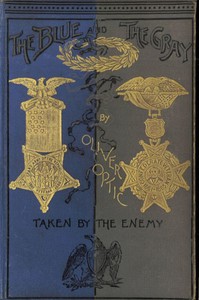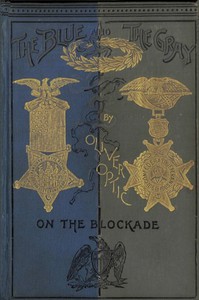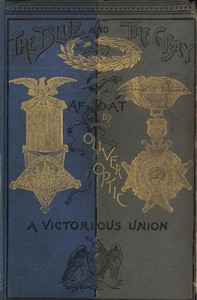Taken by the Enemy, the Enemy by Oliver Optic [the beach read TXT] 📗

- Author: the Enemy by Oliver Optic
Book online «Taken by the Enemy, the Enemy by Oliver Optic [the beach read TXT] 📗». Author the Enemy by Oliver Optic
Invisible punctuation— chiefly quotation marks— has been silently supplied. Other typographical errors are marked in the text with mouse-hover popups.

Price per volume $1.50 TAKEN BY THE ENEMY
WITHIN THE ENEMY'S LINES
ON THE BLOCKADE
STAND BY THE UNION
FIGHTING FOR THE RIGHT
A VICTORIOUS UNION The Blue and The Gray—On Land Two colors cloth Emblematic Dies Illustrated
Price per volume $1.50 BROTHER AGAINST BROTHER
IN THE SADDLE
A LIEUTENANT AT EIGHTEEN
(Other volumes in preparation) Any Volume Sold Separately. Lee and Shepard Publishers Boston

"THE GREAT WESTERN SERIES" "THE WOODVILLE STORIES"
"THE STARRY-FLAG SERIES" "THE BOAT-CLUB STORIES"
"THE ONWARD AND UPWARD SERIES" "THE YACHT-
CLUB SERIES" "THE LAKE-SHORE SERIES"
"THE RIVERDALE SERIES" "THE
BOAT-BUILDER SERIES" ETC. WITH ILLUSTRATIONS BOSTON LEE AND SHEPARD Publishers Copyright, 1888, by Lee and Shepard All rights reserved. Taken by the Enemy. TO MY NEPHEW, HERBERT W. ADAMS, This Book IS AFFECTIONATELY DEDICATED. 5 PREFACE
"Taken by the Enemy" is the first of a new series of six volumes which are to be associated under the general title of "The Blue and the Gray Series," which sufficiently indicates the character of the books. At the conclusion of the war of the Rebellion, and before the writer had completed "The Army and Navy Series," over twenty years ago, some of his friends advised him to make all possible haste to bring his war stories to a conclusion, declaring that there could be no demand for such works when the war had come to an end. But the volumes of the series mentioned are as much in demand to-day as any of his other stories, though from their nature the field of their circulation is more limited. Surprising as this may appear, it is still the fact; and certainly the author has received more commendatory letters from young people in regard to the 6 books of this series than concerning those of any other.
Among these letters there has occasionally been one, though rarely, in which the writer objected to this series for the reason that he was "on the other side" of the great issue which shook the nation to the centre of its being for four years. Doubtless the writers of these letters, and many who wrote no letters, will be surprised and grieved at the announcement of another series by the author on war topics. The writer had little inclination to undertake this task; for he has believed for twenty years that the war is over, and he has not been disposed to keep alive old issues which had better remain buried. He has spent some time in the South, and has always found himself among friends there. He became personally acquainted with those who fought on the Confederate side, from generals to privates, and he still values their friendship. He certainly is not disposed to write any thing that would cause him to forfeit his title to the kind feeling that was extended to him.
It is not, therefore, with the desire or intention to rekindle the fires of sectional animosity, now 7 happily subdued, that the writer begins another series relating to the war. The call upon him to use the topics of the war has been so urgent, and its ample field of stirring events has been so inviting, that he could not resist; but, while his own opinions in regard to the great question of five-and-twenty years ago remain unchanged, he hopes to do more ample justice than perhaps was done before to those "who fought on the other side."
The present volume introduces those which are to follow it, and presents many of the characters that are to figure in them. Though written from the Union standpoint, the author hopes that it will not be found unfair or unjust to those who looked from the opposite point of view.
Dorchester, June 12, 1888.

"Three Cheers for Captain Passford" (Page 75)
"This is most astounding news!" exclaimed Captain Horatio Passford.
It was on the deck of the magnificent steam-yacht Bellevite, of which he was the owner; and with the newspaper, in which he had read only a few of the many head-lines, still in his hand, he rushed furiously across the deck, in a state of the most intense agitation.
It would take more than one figure to indicate the number of millions by which his vast wealth was measured, in the estimation of those who knew most about his affairs; and he was just returning from a winter cruise in his yacht.
His wife and son were on board; but his daughter had spent the winter at the South with her 14 uncle, preferring this to a voyage at sea, being in rather delicate health, and the doctors thought a quiet residence in a genial climate was better for her.
The Bellevite had been among the islands of the Atlantic, visiting the Azores, Madeira, the Canary Islands, and was now coming from Bermuda. She had just taken a pilot fifty miles from Sandy Hook, and was bound to New York, for the captain's beautiful estate, Bonnydale, was located on the Hudson.
As usual, the pilot had brought on board with him the latest New-York papers, and one of them contained the startling news which appeared to have thrown the owner of the Bellevite entirely off his balance; and it was quite astounding enough to produce this effect upon any American.
"What is it, sir?" demanded Christopher Passford, his son, a remarkably bright-looking young fellow of sixteen, as he followed his father across the deck.
"What is it, Horatio?" inquired Mrs. Passford, who had been seated with a book on the deck, as she also followed her husband.
The captain was usually very cool and self-possessed, 15 and neither the wife nor the son had ever before seen him so shaken by agitation. He seemed to be unable to speak a word for the time, and took no notice whatever of his wife and son when they addressed him.
For several minutes he continued to rush back and forth across the deck of the steamer, like a vessel which had suddenly caught a heavy flaw of wind, and had not yet come to her bearings.
"What is the matter, Horatio?" asked Mrs. Passford, when he came near her. "What in the world has happened to overcome you in this manner, for I never saw you so moved before?"
But her husband did not reply even to this earnest interrogatory, but again darted across the deck,





Comments (0)